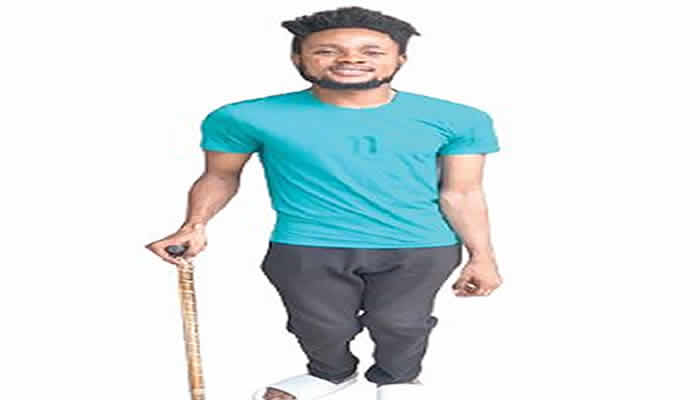
Sharing his story, Ogunnusi Alexander, a digital marketer living with physical challenges in Ogun State, talks about how a freak accident while jumping from a tree led to a spinal cord injury, altering his dream of studying medicine.
How was your upbringing?
My name is Ogunnusi Alexander, aged thirty, from Ijebu-Ode, Ogun State. Living with a physical disability due to a spinal cord injury, I faced emotional lows and struggles to fit in, especially among friends. Grateful for the support of my family and those who stood by me.
What is your occupation?
I work as a digital marketing specialist, managing social media and digital campaigns.
Where do you stand among your siblings?
I am the second child with an older sibling.
Can you recount the incident that caused your disability?
In 2002, during a lesson at a developing site in Abuja, I climbed a tree in search of fruit. Unfortunately, upon jumping down, I landed incorrectly, injuring my spine. Initially brushed off as a minor injury, it soon escalated, affecting my mobility and necessitating urgent medical attention.
Hospitalized and undergoing surgery, I spent months recovering but faced setbacks due to lack of resources for follow-up care. Despite ongoing efforts to seek treatment, hurdles like financial constraints and the COVID-19 pandemic disruptions hindered my progress.
What did the last hospital visit entail?
Recent assessments, including X-rays, highlighted the importance of physiotherapy for potential improvement. The doctors stressed the need for proactive measures, citing muscle atrophy as a considerable challenge, yet holding out hope for walking again.
Are you a university graduate?
Yes, I hold a diploma in theology from Africa Independent Seminary, Niger State, graduating in 2017.
How did your friends support you through your academic journey as a person with disabilities?
With steadfast backing from my mother and peers, I navigated schooling. From primary friends pushing my wheelchair to secondary school assistance, and later, college camaraderie in theology studies, I found a nurturing environment that helped overcome challenges.
Do you recall any impactful moments from your schooling?
In college, the initially uncertain theology path became clearer, thanks to the supportive community of older learners. The proximity of school to home eased commuting struggles, aided by the kindness of fellow commuters and family encouragement, sustaining my optimism.
Reflecting on daily obstacles like mobility, building access, and road crossings, resilience became pivotal in finding solutions. Advocating on platforms like Twitter, I stress the need for inclusive measures to address such barriers for individuals with disabilities.
Living in society presents challenges, such as navigating difficult road crossings for individuals with physical disabilities, making movement a particularly challenging aspect for them.
Are you currently in a relationship?
Not at the moment. Although I have had past relationships, including one with someone I met online. We were together for a couple of years until she started at the University of Lagos, and we drifted apart. However, we remain good family friends today.
Have you ever faced rejection due to your disability?
While some may have experienced rejection based on their disabilities, I personally haven’t encountered many direct rejections. There was an incident where I met someone on social media, and upon meeting in person, she was surprised by my disability, which was clearly stated on my social media bio. It made me take a step back from the situation.
How did you react to that experience?
It was shocking to me as I had been transparent about my condition on my social media platforms. I believe that having a disability should not be an issue for anyone.
You mentioned working as a digital marketer and social media manager. Was that a childhood passion?
As a child, I aspired to become a doctor to save lives. However, due to difficulties in fully recovering from an illness and facing challenges in gaining admission to study medicine, I switched to studying theology as suggested by my mother, considering the family’s financial constraints after my father’s passing.
Has anyone’s words ever affected you negatively?
Growing up, I faced harsh comments from people which sometimes affected me. However, I have managed to overcome challenges, such as not being able to attend university initially, which was a dream of mine. I used to feel down seeing my peers pursue education while I stayed home, but eventually, I pursued theology studies.
How do you motivate yourself?
I believe in finding solutions to challenges and remain optimistic that tomorrow will be better through perseverance. I strive to excel and refuse to be limited by any handicaps.
How do you combat misconceptions about disabilities in your interactions?
Being vocal about disabilities, I actively participate in disability groups and seminars, advocating against misconceptions. For instance, I raise awareness online about a boy in my community with a verbal impairment often misunderstood as a mental disability.
What are your future goals and aspirations?
I strive to be a beacon in the disability community, demonstrating that success is achievable despite disabilities. I am working on a campaign to urge the Governor of Ogun state to adopt the National Disability Act, aiming to make a significant contribution to society.
What kind of assistance are you seeking?
Financial aid for health improvement and career support, such as job opportunities and networking in my field as a freelance digital marketer, social media manager, and digital campaign manager, would be greatly appreciated.
